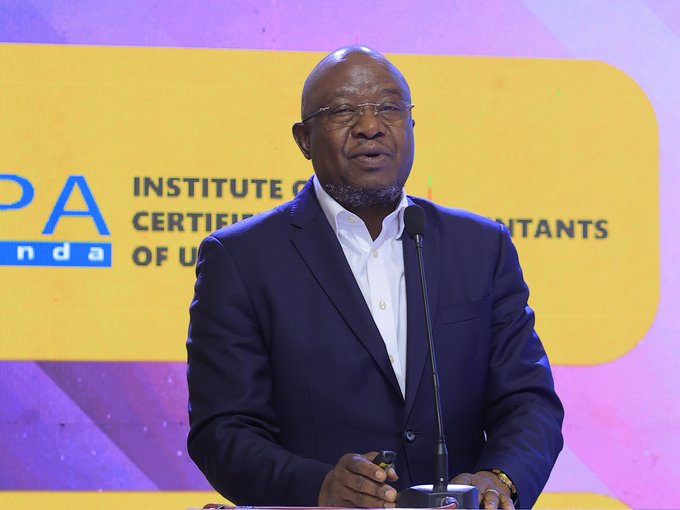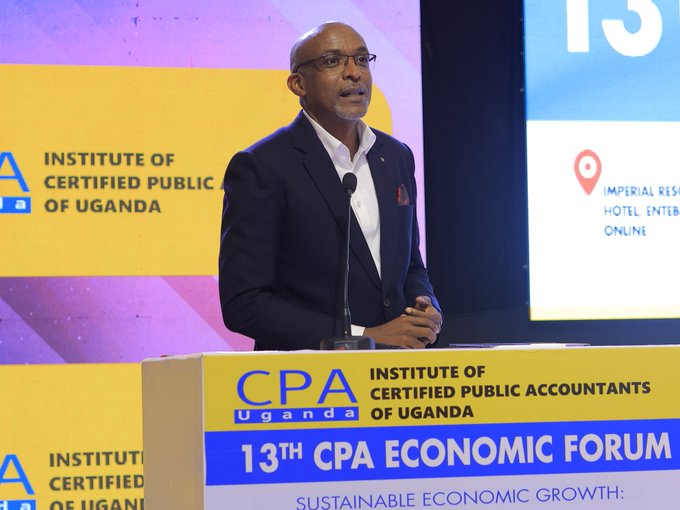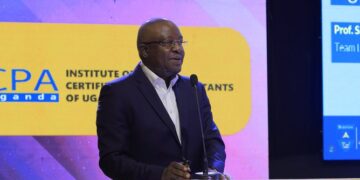Entebbe — Uganda must urgently reimagine its economic strategy to thrive amid rising global volatility, financial pressures, and technological disruption, leading experts have warned at the 13th ICPAU Economic Forum in Entebbe.
Delivering a keynote address, Prof Samuel Sejjaaka emphasised that financial resilience is no longer optional but a matter of survival. With escalating global shocks affecting trade, prices, and livelihoods, he called on policymakers and professionals to adopt smart debt management, digital tax systems, and regional trade integration to fortify Uganda’s economy.
“Are we using the infrastructure we’ve built to its full economic advantage?” Prof. Sejjaaka asked, challenging the nation to pivot from simply constructing roads to nowhere towards developing supply chains, logistics hubs, and value-adding ecosystems. He warned that Uganda must become ‘antifragile’—able not just to endure shocks but to grow stronger from them.
Sejjaaka, Principal and Country Team Leader at MAT ABACUS Business School, painted a stark picture of Uganda’s vulnerabilities, including over-reliance on imports, underutilised agriculture, and a looming oil dependency. “Oil must not become our economic blindfold,” he said, urging the government to channel oil revenues into diversifying the economy through investments in education, health, and infrastructure, not political comforts.

He also flagged Uganda’s youth bulge as either the country’s greatest opportunity or gravest risk. With 73% of the population under 30, he called for massive investments in skilling, innovation, and digital inclusion to harness this demographic dividend.
Public spending also came under scrutiny. “Two-thirds of Uganda’s budget goes to wages. Debt is rising, and the private sector is being squeezed,” Sejjaaka warned, advocating for structural reforms to prioritise investment, entrepreneurship, and economic diversification. While Uganda has posted 6% average GDP growth for nearly two decades, he said this is no longer sufficient to achieve middle-income status without transformative changes.
Digital Economy: From Consumption to Productivity
In a related session on digital transformation, Michael Niyitegeka, Programme Director at Refactory Academy, underscored the urgent need for Uganda to shift from passive digital consumption to meaningful productivity. “Digital transformation isn’t an IT function—it’s a leadership decision,” he said, calling on finance leaders to spearhead this change, leveraging data for strategic advantage.

Niyitegeka highlighted the gap between Uganda’s growing pool of unemployed graduates and industry demand for skilled talent. “We’re training graduates who can’t find jobs while companies cry out for talent,” he noted. 85% of Refactory students, many with no prior coding experience, secure employment within six months—no degrees required, just skills.
He also drew attention to the hidden economic cost of Uganda’s digital habits, citing estimates that apps like TikTok cost UGX 7 billion in data and UGX 10 billion in productivity daily. “Technology must improve processes because processes improve economies,” he said, sharing examples of student-built tech that slashed administrative timelines from months to weeks.

Calling for greater collaboration across institutions, Niyitegeka criticised Uganda’s duplication of digital infrastructure. “If we’ve built a digital superhighway, let’s stop transporting wheelbarrows on it,” he quipped, urging leaders to focus not just on building infrastructure but also on developing the capacity to use it meaningfully.
Held under the theme “Building Resilience Through Innovation”, the 13th CPA Economic Forum brought together economists, policymakers, business leaders, and tech innovators to confront Uganda’s pressing economic realities. From restructuring public spending and rethinking agriculture to embracing digital transformation and preparing youth for future economies, the Forum’s dialogue pointed toward a shared conclusion: Uganda’s resilience must be built, not assumed.









